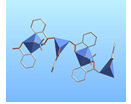 |
|
 |
|
 |
|
 |
|
 |
|
 |
|
 |
|
Eppley Group Research
![]()
Our group is broadly interested in a group of inorganic compounds known as "coordination complexes." In a coordination complex a bond is formed by an atom or group of atoms (called a "ligand") donating a pair of electrons to a metal cation. Specifically we are interested in trying to make new coordination complexes that contain lots of metal centers (in the form of a metal-organic network structure or discrete aggregates of metal ions surrounded by organic ligands). Past examples of these types of reactions are influenced greatly by the type of solvent they are performed in. We do our reactions a bit differently, though, by performing the reactions in ionic liquid solvents and using other non-traditional reaction methods. Ionic liquids are actually made up of positive and negative ions, just like sodium chloride, but unlike sodium chloride which melts at a very high temperature, they are liquids at room temperature. We are using the unusual solvent environment so that we can hopefully get new products!
Kate Ziegelgruber (Chemistry, '08) spent the Fall of '06 in Professor Chris Cahill's group at the George Washington University in Washington, DC working on the synthesis of thorium metal-organic frameworks in hydrothermal systems. I even got a chance to visit because I am on sabbatical. In addition to a publication from her work with me, she will also get a publication based on her work with Chris. Kate was also named as the Student Liaison for planning the undergraduate programming for upcoming American Chemical Society Meetings (including the one in Chicago in March). She is the only undergraduate to be selected for this committee! Congratulations to Kate! More News
Additional Information about my Research
How do I get involved in research in your group?
| DePauw University | ||||